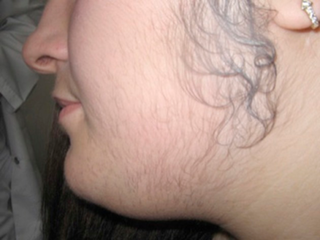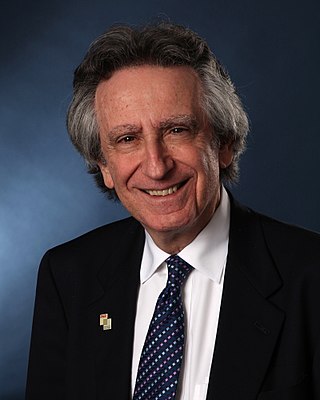
Endocrinology is a branch of biology and medicine dealing with the endocrine system, its diseases, and its specific secretions known as hormones. It is also concerned with the integration of developmental events proliferation, growth, and differentiation, and the psychological or behavioral activities of metabolism, growth and development, tissue function, sleep, digestion, respiration, excretion, mood, stress, lactation, movement, reproduction, and sensory perception caused by hormones. Specializations include behavioral endocrinology and comparative endocrinology.

Hirsutism is excessive body hair on parts of the body where hair is normally absent or minimal. The word is from early 17th century: from Latin hirsutus meaning "hairy". It usually refers to a male pattern of hair growth in a female that may be a sign of a more serious medical condition, especially if it develops well after puberty. Cultural stigma against hirsutism can cause much psychological distress and social difficulty. Discrimination based on facial hirsutism often leads to the avoidance of social situations and to symptoms of anxiety and depression.
Amenorrhea is the absence of a menstrual period in a female who has reached reproductive age. Physiological states of amenorrhoea are seen, most commonly, during pregnancy and lactation (breastfeeding). Outside the reproductive years, there is absence of menses during childhood and after menopause.
Pediatric endocrinology is a medical subspecialty dealing with disorders of the endocrine glands, such as variations of physical growth and sexual development in childhood, diabetes and many more.
The Endocrine Society is a professional, international medical organization in the field of endocrinology and metabolism, founded in 1916 as The Association for the Study of Internal Secretions. The official name of the organization was changed to the Endocrine Society on January 1, 1952. It is a leading organization in the field and publishes four leading journals. It has more than 18,000 members from over 120 countries in medicine, molecular and cellular biology, biochemistry, physiology, genetics, immunology, education, industry, and allied health. The Society's mission is: "to advance excellence in endocrinology and promote its essential and integrative role in scientific discovery, medical practice, and human health."
A fellowship is the period of medical training, in the United States and Canada, that a physician, dentist, or veterinarian may undertake after completing a specialty training program (residency). During this time, the physician is known as a fellow. Fellows are capable of acting as an attending physician or a consultant physician in the specialist field in which they were trained, such as internal medicine or pediatrics. After completing a fellowship in the relevant sub-specialty, the physician is permitted to practice without direct supervision by other physicians in that sub-specialty, such as cardiology or oncology.
Reproductive endocrinology and infertility (REI) is a surgical subspecialty of obstetrics and gynecology that trains physicians in reproductive medicine addressing hormonal functioning as it pertains to reproduction as well as the issue of infertility. While most REI specialists primarily focus on the treatment of infertility, reproductive endocrinologists are trained to also test and treat hormonal dysfunctions in females and males outside infertility. Reproductive endocrinologists have specialty training (residency) in obstetrics and gynecology (ob-gyn) before they undergo sub-specialty training (fellowship) in REI.
The European Society of Endocrinology (ESE) is a scientific society to promote for the public benefit research, education and clinical practice in endocrinology by the organisation of conferences, training courses and publications, by raising public awareness, liaison with national and international legislators.

Autoimmune polyendocrine syndrome type 1 (APS-1), is a subtype of autoimmune polyendocrine syndrome. It causes the dysfunction of multiple endocrine glands due to autoimmunity. It is a genetic disorder, inherited in autosomal recessive fashion due to a defect in the AIRE gene , which is located on chromosome 21 and normally confers immune tolerance.
Transgender hormone therapy, also called hormone replacement therapy (HRT) or gender-affirming hormone therapy (GAHT), is a form of hormone therapy in which sex hormones and other hormonal medications are administered to transgender or gender nonconforming individuals for the purpose of more closely aligning their secondary sexual characteristics with their gender identity. This form of hormone therapy is given as one of two types, based on whether the goal of treatment is masculinization or feminization:
Maria Iandolo New is a professor of Pediatrics, Genomics and Genetics at Icahn School of Medicine at Mount Sinai in New York City. She is an expert in congenital adrenal hyperplasia (CAH), a genetic condition affecting the adrenal gland that can affect sexual development.
The American Association of Clinical Endocrinology (AACE), formerly known as the American Association of Clinical Endocrinologists, is a professional community of physicians specializing in endocrinology, diabetes, and metabolism. AACE's mission is elevating clinical endocrinology to improve global health. The association is headquartered in Jacksonville, Florida, US.
The European Journal of Endocrinology is a monthly peer-reviewed medical journal covering endocrinology with a focus on clinical and translational studies, research, and reviews in paediatric and adult endocrinology. It is the clinical journal of the European Society of Endocrinology. The editor-in-chief is Wiebke Arlt. The journal has been published by Bioscientifica since 1999.
The Society for Endocrinology is an international membership organisation and registered charity representing scientists, clinicians and nurses who work with hormones. The Society was established in 1946, and currently has approximately 3,000 members.
Alka Kriplani is an Indian gynecologist,medical writer and academic, known for her contributions to the fields of Reproductive Endocrinology and Gynaecological Endoscopy. She was professor and the Head of the Department of Gynecology and Obstetrics at the All India Institute of Medical Sciences, New Delhi. A recipient of the Dr. B. C. Roy Award in 2007, she was honoured by the Government of India in 2015 with Padma Shri, the fourth highest Indian civilian award.

Endocrine-Related Cancer is a monthly peer-reviewed medical journal covering cancers in endocrine organs — such as the breast, prostate, pituitary, testes, ovaries, and neuroendocrine system — and hormone-dependent cancers occurring elsewhere in the body. Its scope covers basic, translational, clinical and experimental studies.

Eli Y. Adashi is an American physician-scientist-executive who served as the Fifth Dean of Medicine and Biological Sciences at Brown University. Adashi is presently a tenured Professor of Medical Science with the Warren Alpert Medical School of Brown University. He is a member of the National Academy of Medicine, the New York Academy of Sciences, and the Association of American Physicians (AAP). Adashi is also a fellow of the American Association for the Advancement of Science (AAAS), the Hastings Center Ethics Research Institute, and the Royal Society of Medicine.

Allenolic acid, or allenoic acid, is a synthetic, nonsteroidal estrogen discovered in 1947 or 1948 that, although studied clinically, was never marketed. It is an open-ring or seco-analogue of steroidal estrogens like estrone and equilenin. The compound was named after Edgar Allen, one of the pioneers in estrogen research. Although described as an estrogen, allenolic acid probably is totally inactive at the receptor, whereas a derivative, allenestrol, is reported to be a potent estrogen. Another derivative of allenolic acid, methallenestril, is also a potent estrogen and, in contrast to allenolic acid and allenestrol, has been marketed.
Endocrine Connections is a society-owned, monthly, peer-reviewed, open access academic journal. It covers endocrinology with a focus on basic, clinical and translational research and reviews in all areas of endocrinology, including papers that deal with non-classical tissues as source or targets of hormones and endocrine papers that have relevance to endocrine-related and intersecting disciplines and the wider biomedical community. It is jointly owned by the European Society of Endocrinology and the Society for Endocrinology. The editor-in-chief is Professor Adrian Clark, who succeeded Professor Josef Köhrle in 2021. According to the Journal Citation Reports, the journal has a 2022 impact factor of 2.9. The journal has been published by Bioscientifica since 2012.
International Society for Clinical Densitometry (ISCD) is a professional community of physicians with more than 2,700 individual members from over 25 countries. The society advocated an advance in the assessment of musculoskeletal health through education, certification and facility accreditation. The association is established in 1993 and headquartered in Middletown, Connecticut, United States.






